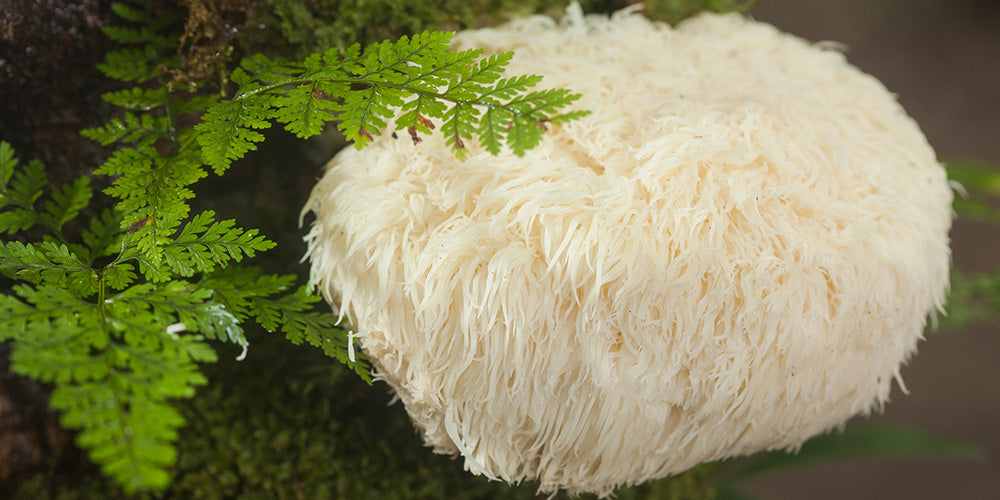Lion's mane mushroom, known for its distinctive look, is also renowned for its many cognitive benefits. Often called Japanese Yamabushitake or hedgehog mushroom, this edible fungus is a powerful brain mushroom that’s said to improve one’s memory and aid in brain regeneration.
This delicious mushroom has also been used in traditional Chinese and Japanese medicine for immune support, gut health, and for supporting the spleen. If you are looking for a natural way to boost your brain and overall health, lion's mane mushroom is something to consider.
What is Lion's Mane?
Lion's mane (Hericium erinaceus) is a species of mushroom that you can find in the wilds of North America, Europe, and Asia. It grows on trees or logs, and has teeth-like spines that drop downwards, giving it the appearance of a lion's mane (hence the name).
These mushrooms have an interior structure like the cauliflower, with branches growing from a single base. It has a soft and spongy texture and is known for its mouthwatering flavor. A lion's mane mushroom has been compared to the meat of crab or lobster with a flavor that is mild and somewhat sweet. The "teeth" are a delicious meat alternative since the texture resembles meat when cooked.
The lion’s mane mushrooms are known to be rich in nutrients and vitamins such as beta-glucans, niacin, riboflavin, and thiamine. They are also an excellent source of essential minerals such as potassium, zinc, and manganese.
In addition to being edible, lion's mane mushrooms are also medicinal and provide a number of health advantages.

What are the Benefits of Lion's Mane Mushrooms?
Some of lion's mane benefits are:
Builds the Immune System
In order to defend the body against bacteria, viruses, and other disease-causing pathogens, it is essential to have a strong immune system.
Lion’s mane mushrooms are packed with polysaccharides like beta-glucans. According to a study, because of these polysaccharides, lion’s mane can increase intestinal immune system activity. [1] This helps shield the body from pathogens that enter the gut through the mouth or nose, thereby strengthening one’s immunity.
Oligosaccharides, a type of carbohydrate that supports antioxidative and antitumor functions, is abundantly available in the mushroom as well.
Enhances Cognitive Function
In 2008, researchers found that lion’s mane mushrooms can improve cognitive function among adults aged 50-80 years old. When compared to those who received placebos, those who had taken Hericium erinaceus orally had better scores cognitively.
Improves Mood & Reduces Inflammation
Lion's mane may also help relieve the feelings of depression and anxiety, and help improve one’s mood—all due to its anti-inflammatory and antioxidant properties. [2][3]
Improves Sleep
According to a 2015 pilot research, lion's mane mushroom helps to promote restful sleep in those experiencing severe stress. This study found that after 4 weeks of taking the mushroom, the female participants who were undergoing examinations felt their anxiety was reduced. Due to decreased levels of stress, the subjects also claimed to sleep more soundly.
Does Lion's Mane Have Side Effects?
While generally safe to consume, lion's mane side effects are mild, such as stomach discomfort. However, the following precautions should be taken:
-
It is not advised for pregnant or breastfeeding women to consume lion’s mane as there isn't enough research available to demonstrate how it can impact them
-
If you are allergic to mushrooms or fungi that grow on trees, you may be allergic to lion's mane as well. You should talk with your doctor before taking any lion’s mane supplement
-
Your doctor might advise against taking lion’s mane if you take any medications regularly (including those used for anxiety) because the two could interact negatively with each other and cause side effects
How Do You Consume Lion's Mane?
Lion's mane can be consumed in many different forms. It can be eaten raw, cooked, or dried. There is even lion's mane coffee. However, it is most popularly taken as a tea or in capsules.

There are currently no standard formulations or dosage guidelines for lion's mane though it is often taken in doses of 250-750 mg. You might want to pay special attention to your lion's mane supplement’s packaging instructions or as prescribed by your doctor.
When looking for a lion’s mane supplement, it is important to find one that contains the fruiting body of the mushroom. Most “mushroom” products are not mushrooms at all. They are mycelia. Mushrooms are the fruiting bodies of fungi that grow up through the ground. Mycelia are root-like structures that grow underground. Because mycelia that grows in the wild are too fragile to harvest, those in supplements are grown in plastic bags on rice or other grains. As they mature, they become part of the grain. Because they cannot later be separated, what ends up in your capsule is over 50% grain
Our MyPure™ Lion's Mane 4X provides 250 mg of our 1:1 extract and 250 mg of our 8:1 extract. Both extracts are 100% non-GMO, certified organic Lion’s Mane fruiting body mushrooms that are hot water treated to rupture the mushroom cell walls and maximize nutrient bioavailability.
If taking capsules is not an option, then about one cup of hot water steeped with lion’s mane mushroom each night before bedtime will work just fine too.
Conclusion
If there’s one big takeaway from this piece, it’s that Lion’s Mane really does work. It a powerful and effective nootropic supplement that can help to support healthy brain function, nerve growth, and immune function. It also promotes cognizance, memory, and mood.
Sources
[1] Sheng, Xiaotong et al. “Immunomodulatory effects of Hericium erinaceus derived polysaccharides are mediated by intestinal immunology.” Food & function vol. 8,3 (2017): 1020-1027. doi:10.1039/c7fo00071e
[2] Nagano, Mayumi et al. “Reduction of depression and anxiety by 4 weeks Hericium erinaceus intake.” Biomedical research (Tokyo, Japan) vol. 31,4 (2010): 231-7. doi:10.2220/biomedres.31.231
[3] Tolkien, Katie et al. “An anti-inflammatory diet as a potential intervention for depressive disorders: A systematic review and meta-analysis.” Clinical nutrition (Edinburgh, Scotland) vol. 38,5 (2019): 2045-2052. doi:10.1016/j.clnu.2018.11.007

